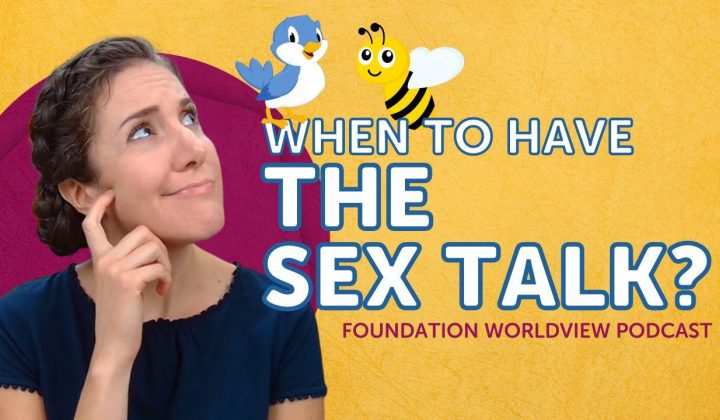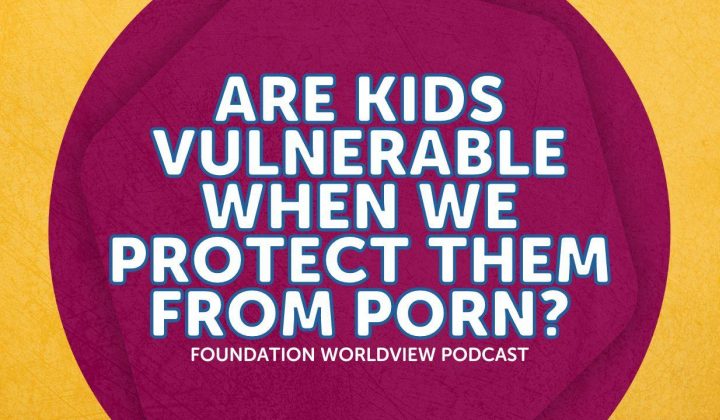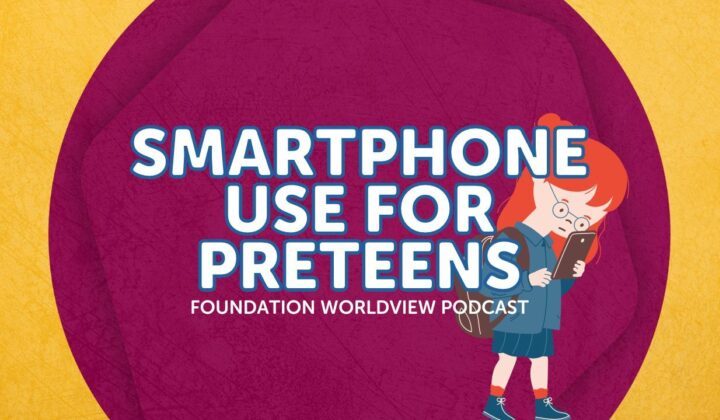Learn more about the journey that led to us equipping kids to carefully evaluate every idea they encounter.
Meet members of our team who have contributed to curriculum development.
Hear from real users of the Foundation Curriculum.
Learn what we believe about God, Jesus, Scripture, and more.
Talking to Kids About Death and Funerals
In this episode of the Foundation Worldview Podcast, Elizabeth Urbanowicz speaks directly to every parent's heart, addressing the delicate task of preparing our young ones for a funeral. Elizabeth advises parents to embrace honesty, using words that resonate without causing confusion. She explains the concept of death as a temporary separation of the body and soul. By leaning into Scripture, Elizabeth provides comforting passages that can help little hearts process big feelings. As she shares, even in the shadow of death, we find hope and light through our faith in Jesus. If you're facing the challenge of discussing funerals with a young one, this episode is a must-listen.
Transcript
Note: The following is an auto-transcript of the podcast recording.
So we're going to dive down deep into this question today, but before we do, if you have found the content of this podcast beneficial, please make sure you like and subscribe so that you never miss any future episodes. Also, ask that you would invest the time in writing a review so that more people can discover this content and we can equip as many children as possible to understand the truth of the biblical worldview.
Now, the first thing I want to say to the person who wrote this question is, by the time we've gotten to this question, your funeral has already passed. We also record these podcasts two to three months in advance. So this will come out after you have gone to the funeral, so I apologize for that. But hopefully what we talk about can still be used to talk to your son about this, or actually, it was yes, four-year-old son, your son about this for preparation of funerals in the future and even just encountering death.
Now, the first thing that I think is important when we're talking with young children about death is to not use euphemisms. Don't say like they have passed away or they've passed on or they've gone to heaven or they've gone to a better place. While these things can be true, using euphemisms like this can easily confuse a child and get them even more confused than before we talked with them about this concept. So I would encourage anyone watching or listening when we're talking with our children that we actually use the word death. And I know that's hard because our culture likes to use euphemisms. We don't like to say so-and-so died. We like to say they passed away or they moved on or they went to heaven, but we just need to use the word death when we're talking with our children.
And then I think what's really important is that we focus on the biblical example. We focus on what is death biblically and walk through that with our children.
So the first thing just talking about death, when we're talking about death with our kids, we can talk about what it is - that God made us as body and soul. In Genesis chapter 2, it talks about God forming Adam out of the dust of the ground and then breathing into him the breath of life. That we are both body and soul. Those of you who have taken your children through the Foundation Biblical Worldview curriculum with four-year-olds on up, know that we specifically cover this in that curriculum because our children must understand that we are both physical and spiritual. We are body and soul, and death is when our bodies stop working. And so our soul leaves our bodies. So our kids must understand this. Now, they may have lots of questions about that and about how that works, and we can answer them to the best of our abilities, but we also want our kids to know that that is not our natural state. Having the soul separated from the body is not the natural state, because when Jesus came back when he resurrected, he didn't come back as a spirit, he came back as a body, and soul, just as a human. And so that is going to be our final state for all eternity, that Jesus is going to come back and our bodies are going to be resurrected and our souls and our resurrected bodies are going to be united for all eternity.
Okay, so first just explain to our kids what death is. Death is when our bodies stop working and our soul and our body are separated. And this is not the natural state. That one day when Jesus comes back and all humans are resurrected, some are resurrected to eternal life, and some are resurrected to eternal death. That body and soul are then reunited. And so we want our kids to understand this.
Now, are they going to have lots of other questions? Yes, they're going to have lots of other questions, and so we just need to be prepared for that. But we also want to make sure that we're giving them a biblical understanding of what death is because there's a lot of confusion Weven within the church today about death that so often Christians have just bought into this Western idea that we always need to be happy. And so, therefore, we don't have funerals anymore. We often have a celebration of life services or memorial services, and while we can celebrate someone's life and we can enjoy the memory of them, we need to have funerals, to have these times of public corporate grieving the loss of someone. Because biblically we don't see, we don't see that once Jesus died, resurrected, and ascended, all the people were just celebrating as soon as someone died. Yes, we know to be absent from the body is to be present with the Lord. But we also see people in the New Testament grieving the loss of others. And the Bible is clear that death is the ultimate enemy. And so we want our kids to know that when we go to this funeral today, it's going to be a sad time and there's going to be people there who are crying. We might cry because this is sad because death is the ultimate enemy.
And a passage of Scripture we can take them to is 1 Corinthians chapter 15 verses 21 through 26. And in this passage, Paul writes, "For as by a man came death, by a man has come also the resurrection of the dead. For as in Adam all die, so also in Christ shall all be made alive. But each in his own order: Christ the first fruits, then at his coming those who belong to Christ. Then comes the end, when he delivers the kingdom to God the Father after destroying every rule and every authority and power. For he must reign until he has put all his enemies under his feet. The last enemy to be destroyed is death." And so this passage we can read to our kids in talking about through Adam all die and through Jesus eternal life is possible, but we don't see that quite yet, that Jesus is still going to return this time not as the suffering servant, but as the conquering king. And he is going to destroy sin and death once and for all. That death is the ultimate enemy. It's the final enemy to be destroyed.
We also want our kids to understand that it's really hard in this life that God has given us many good gifts, but this life is also really hard as we're eagerly waiting for Jesus to return and defeat death once and for all. A great passage we can take our kids to is in Romans chapter 8, verses 22 and 23. And this passage says, "For we know that the whole creation has been groaning together in the pains of childbirth until now. And not only the creation, but we ourselves, who have the first fruits of the Spirit, groan inwardly as we wait eagerly for adoption as sons, the redemption of our bodies." That we're all groaning in this life as we are waiting for Jesus to come back and defeat death once and for all. And so we want our kids to understand, that death is a painful thing because it's the ultimate enemy and we are eagerly waiting for Jesus to come back and destroy death once and for all.
Now with this, we also want to make sure that our kids know that we don't grieve as those who have no hope. We have hope ultimately, in Jesus the rescuer, there are many passages that are great for talking about this, but one that I think is particularly pertinent is 1 Thessalonians chapter 4, verses 13 through 18. In this passage, Paul writes, "But we do not want you to be uninformed, brothers, about those who are asleep, that you may not grieve as others who do not have hope. For since we believe that Jesus died and rose again, even so through Jesus, God will bring with him those who have fallen asleep. For this we declare to you by a word from the Lord, that we who are alive, who are left until the coming of the Lord, will not precede those who have fallen asleep. For the Lord himself will descend from heaven with a cry of command, with the voice of an archangel, and with the sound of the trumpet of God. And the dead in Christ will rise first. Then we who are alive, who are left will be caught up together with them in the clouds to meet the Lord in the air, and so we will always be with the Lord. Therefore encourage one another with these words." And so we want to make sure that our kids do understand that there's this ultimate hope. Again, we don't want to solely focus on that so that there's no grieving because the biblical model is to grieve, to understand that death is the ultimate enemy and that we are rightly groaning while we are here on this earth, but we don't grieve as those who have no hope because our ultimate hope is in Jesus.
So I think once we've read through these passages with our kids, our kids, especially young ones, 4, 5, 6, they're not going to remember everything that was said in these verses. So what I think we can do is I think we can just give them a formula, a short formula that we can go through to help them understand what was just covered. And I think if we cover four things that can be really helpful. First, death is an enemy. Second, death came through sin. Third, Jesus defeated sin. Fourth, Jesus will return to destroy death forever. Again, those four things are: death is an enemy, death came through sin, Jesus defeated sin, and Jesus will return to destroy death forever.
So again, just in summary, we need to be honest with our children. We don't want to use euphemisms. We want to talk actually about death. We want to explain what death is, that it is the separation of body and soul, that our body ceases to function and therefore our soul and our body are separated. But that's not the natural state, okay? When our loved ones go to be with the Lord that is not their final state. That we are waiting for the resurrection of the dead, for Jesus to come back, for him to give us resurrected bodies, and for our body and soul to be united again forever. Then we want to make sure that they have a theological understanding of death, that death is the ultimate enemy, and we are inwardly groaning as we wait for Jesus to return and ultimately defeat death. But we have this hope and we don't grieve as those without hope because Jesus has rescued us, and he will one day return to destroy death forever.
Well, that's a wrap for this episode. But if you have a question that you would like for me to cover on a future Foundation Worldview podcast, you can submit that question by going to FoundationWorldview.com/podcast. As we leave our time together, my prayer for you as always is that no matter the situation in which you and the children God has placed in your care, find yourselves that you trust that God is working all things together for your good by using all things to conform you more into the image of His Son. I'll see you next time.
Related Posts and insights

When To Have The Sex Talk?
How should you have the sex talk with your son or daughter? Do you talk to them individually or as a group? This episodes takes a look at the goals behind the sex talk and provides tips to have this conversation with your child. We also include information on resources that are available to help parents talk to their kids about sex.

Are Kids Vulnerable When We Protect Them from Pornography?
Today's question says, "By protecting our kids from pornography, are we putting them in danger of being too easily aroused? Most people who consume tons of media today are somewhat desensitized to the porn that pervades all of society. If we hide these things from our kids, do we increase the allure when they finally do see it?"

Balancing Protection & Freedom: Navigating Smartphone Use for Preteens
Join Elizabeth Urbanowicz on the Foundation Worldview Podcast as she addresses a pressing concern for today's parents: How to strike a balance between safeguarding preteens from digital pitfalls, like explicit content, while still allowing them the freedom to connect with peers. Dive into biblically-informed and reality-based approaches to guide and protect the young minds entrusted to our care in a digital age.





